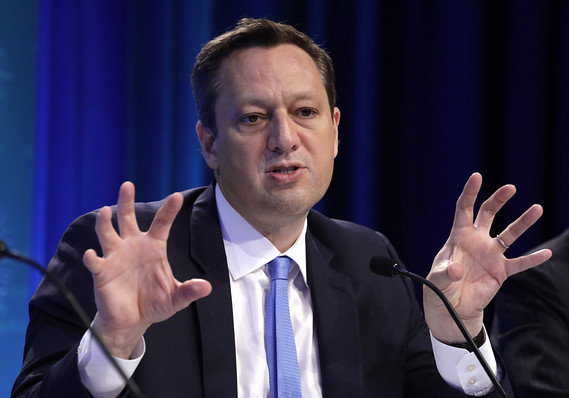 Bloomberg News/Landov
Bloomberg News/Landov
The Federal Reserve might be forced to tighten monetary policy to address financial stability risks, a senior International Monetary Fund official told MarketWatch in an interview.
Tobias Adrian, the head of the financial market oversight division at the International Monetary Fund, said the recent tightening in financial conditions over the fourth quarter of last year was “too short-lived” to cause a meaningful reduction in the buildup of financial market vulnerabilities.
That has left medium term risks to financial stability broadly unchanged, the IMF said in its latest global financial stability report, which was overseen by Adrian.
“With global financial conditions still accommodative notwithstanding their tightening, financial vulnerabilities will likely to continue to build,” the IMF said.
The best way to address vulnerabilities is not to use interest rates but to use “macroprudential policy,” Adrian said.
“But if you don’t have the macroprudential tools, then what do you do? Well, then it might become a monetary policy consideration at some point,” Adrian said.
The idea of using interest rates to promote financial stability is controversial at the Fed.
At his press conference last month, Fed Chairman Jerome Powell said “the whole question of monetary policy and financial stability is an unsettled and difficult one.”
To be clear, however, Adrian said the IMF supports the Fed’s pivot to a patient policy stance at the beginning of the year.
This move, along with actions from other central banks, helped the markets SPX, +0.00% recover from the sharp selloff seen late last year, he said.
“I would call the last six months a roller coaster,” Adrian said in an interview in his office.
“We saw a very sharp selloff in the fourth quarter and in our assessment that reflected worries about downside risks, worries about a hard landing,” he said.
The Fed’s action was central to the market’s recovery. “In our view, the Fed really took away the downside risks,” he said.
The U.S. central bank had room to pivot because inflation was so low and financial market vulnerabilities in the U.S. were moderate.
At the moment, the yield curve is “basically flat.” This is “consistent more with a soft landing” than a recession, he said.
But financial vulnerabilities remain a possible dark cloud in the horizon. And that could move the Fed off the sidelines.
Mohamed El-Erian, chief economic adviser at Allianz SE, wrote recently he was worried the Fed’s easy policy stance could end up threatening financial stability by encouraging investors to take big risks.
The vulnerabilities in the U.S. are in the corporate sector and among nonbank financial intermediaries, the IMF report said.
“Overall debt levels and financial risk taking have increased, and creditworthiness of borrowers has deteriorated in the investment-grade bond and leveraged loan markets,” the IMF report said.
Read: IMF worried financial conditions could change quickly








